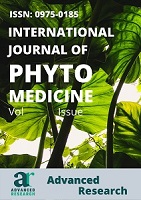Dipeptidyl peptidase IV (DPP-IV/CD26) inhibitory and free radical scavenging potential of W. somnifera and T. foenum-graecum extract
Keywords:
Antidiabetic plants, Antioxidant, DPP-IV inhibitors, In vitro, Type 2 diabetes mellitusAbstract
The incretin hormone glucagon-like peptide 1 (GLP-1), proposed as a new target for the treatment of type 2 diabetes, is rapidly cleaved by dipeptidyl peptidase-IV enzyme (DPP-IV/CD26). DPP-IV inhibitors enhance circulating GLP-1 level, which in turn resulted into improved glucose tolerance and insulin secretion. The present study was designed to evaluate DPP-IV inhibitory activities vis a vis anti-peroxidative potential, if any, in two antidiabetic plants. We studied in vitro DPP-IV inhibition; DPPH radical scavenging potential; ß-carotene bleaching; reducing power and total phenolics content at the varying concentrations (0.1 – 1 mg/ml) in the extracts of W. somnifera (WS) root and T. foenum-graecum (TFG) seeds. Methanolic extract (0.5 mg/ml) of WS inhibited DPP-IV activities (69.7 ±0.56%) at greater extent than that of TFG (51.8±1.24%), as compared to control. WS extract contains relatively higher amount of total phenolics, elevated DPPH free radical scavenging potential and pronounced reducing power efficacy than that of TFG. The result of present study ravel that WS and TFG extracts contain some novel DPP-IV inhibitors with antiperoxidative potential and could be developed as therapeutic molecules for type 2 diabetes mellitus.
References
. Kala CP, Dhyani PP, Sajwan BS.
Developing the medicinal plants
sector in Northern India: challenges
and opportunities. J Ethanobiol
Ethnomed. 2006;2:32.
. Pei SJ. Ethnobotanical approaches of
traditional medicinal studies: some
experiences from Asia. Pharm
Biol.2001;39:74-79.
. Das DC, Sinha NK, Chattopadhyay
JC, Das M, Samanta P. The use of
Medicinal Plants for the treatment of
Gonorrhoea and Syphilis in South
West Bengal of India. Int J Phytomed.
;5(1).
. Goossens H, Ferench M, Vander SR,
Elseviers M. Outpatient antibiotic use
in Europe and association with
resistance: a cross-national database
study. Lancet. 2005;365:579-587.
. Kinghorn AD, Chai HB, Sung CK,
Keller WJ. The classical drug
discovery approach to define bioactive
constituents of botanicals.
Fitoterapia.2011;82(1):71-79.
. Cos P, Vlietinck AJ, BergheDV, Maes
L. Anti-infective potential of natural
products;how to develop a stronger in
vitro Âproof-of conceptÊ. J
ethnopharmacol.2006;106:290-302
. Houghton PJ. Old yet newpharmaceuticals from plants. J Chem
Edu . 2001;78:175
. Nahrstedt A, Butterweck V. Lessons
learned from herbal medicinal
products:the example of St JohnÊs
Wort. J Nat Prod. 2010;73:1015-1021
. Gerald B. Biologically active
compounds from marine organism.
Phytother Res. 2001;15:89-94.
. Newman DJ, Cragg GM.Natural
products as sources of new drugs
over the last 25 years. J Nat Prod.
;70:461-477.
. Dossey A. Insects and there
chemicals weaponry:new potential for
drug discovery. Nat Prod Rep.
;27:1737-1757.
. Dorman HJ, Deans SG. Antimicrobial
agents from plants : activity of plant
volatile oils. J Appl Microbiol.
;88:308-316.
. Asghari J, Ondruschka B,
Mazaheritehrani M. Extraction of
bioactive chemical compounds from
the medicinal Asian plants by
microwave irradiation. J Med Plant
Res. 2011;5:495-506.
. Zaika LL. Species and herbs their
antimicrobial activity and its
determination. J.Food Safty.
;9:97-118.
. Gordon MC, David J. Natural Product
drug discovery in the next millenium.
Pharm Bio. 2001;139: 8-17.
. Vedavaty S, Mrudal V, Sudhakar A.
Tribal medicine in Chitton district,
Andhra Pradesh, India. Vedamse
Books P Ltd. 1997.
. Chan-Bacab MJ, Pena-Rodriguez LM.
Plant natural products with
leishmanicidal activity. Nat Prod Rep.
; 18 : 674 ă 688.
. Evans WC. Trease and EvanÊs
Pharmacognosy. 14th Edition. W B
Saunders Co. 1996; 290.
. Perez C, Paul M , Bazerque P.
Antibiotic assay by agar by agar ă well
diffusion method. Acta Biol Med Exp.
15 :113 -115.
. Olurinola PF. A Laboratory Manual of
Pharmaceutical Microbiology. National
Institute for Pharmaceutical Research
and Development, Abuja, Nigeria.
; 69-105.
. Samanta K, Hossain E, Pal DK.
Anthelmentic activity of Hygrophila
difformis Blume. J Buffalo science.
; 1:35-38.
. Kokate CK, Purohit AP, Gokhale SB.
Pharmacognosy. 14 edition. Nirali
Prakasanan, Pune, India. 2008; 1 ă
. Harborne JB, Harborne JB.
Phytochemical methods ; A Guide to
Modern Techniques of plant analysis.
Champman and Hall, New York. 1998
; 1- 320.
. Harborne JB. Phytochemical methods
: A Guide to Modern Techniques of
plant of analysis. 3rd Edition.
Chapman and Hall , New York. 1998;
ă 302.
. Rios JL, Recio MC. Medicinal plants
and antimicrobial activity. J
Ethnopharmacol. 2005;100:80-84.
. Cao Y, Wei X, Xu H, Tang W.
Antifungal properties of methanol
extracts and its active compounds
from Brickellia rosmarinifolia .Vent
Fitoterapia. 2010;81(8):1176-1179.
. Sule A, Ahmed QU, Samah OA, Omar
MN, Hassan NM, Kamal LZM.
Bioassay guided isolation of
antibacterial compounds from
Andrographis paniculata. Am J Appl
Sci. 2011;8:525-534.
. Tsuchiya H, Sato M, Miyazaki T,
Fujuwara S, Tanigaki S, Ohayama M,
Tanaka T, Linuma M. Comparative
study on the antibacterial activities of
phytochemical flavonones against
methicillin resistant Staphylococcus
aureus. J Ethnopharmacol.
;50:27-34.
. Ya C, Gaffney SH, Lilley TH, Haslam
E. Carbohydrate-Polyphenol
Complexation.In: Chemistry and
Significance of condensed tannins.
Hemingway RW, Karchesy JJ, ed. In
Plenum Press, New York.1988;553.
. Nabila B, Fawzia BA, Tatjana PK.
Antioxidant and Antimicrobial activities
of Pistacia lentiscus and Pistacia
atlantica extracts. Afr J Pharm
Pharmacol.2008;2 (2):22-28.
. Rupasinghe HP, Jackson CJ, Poysa
V, Berardo CD, Bewley JD, Jenkinson
J. Soyasapogenol A and B distribution
in soyabean (Glycine max L. Merr) in
relation to seed physiology, genetic
variability and growing location. J Agr
Food Chem.2003;51:5888-5894.
. Argal A, Pathak AK. CNS activity of
Calotropis gigantea roots. J
Ethnopharmacol. 2006;106:142-145.
. Malairajan P, Gopalakrishnan G,
Narasimhan S, Veni KJK. Analgesic
activity of some Indian medicinal
plants. J Ethnopharmacol.
;106:425-8.



